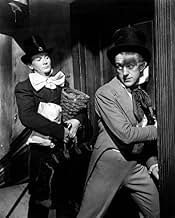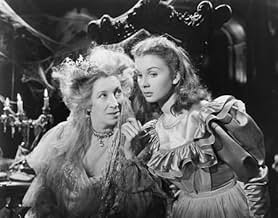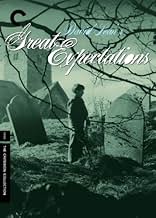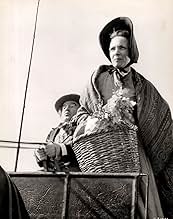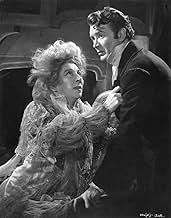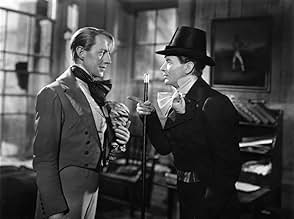NOTE IMDb
7,8/10
28 k
MA NOTE
Un simple orphelin devient soudainement un gentleman grâce à un bienfaiteur inconnu.Un simple orphelin devient soudainement un gentleman grâce à un bienfaiteur inconnu.Un simple orphelin devient soudainement un gentleman grâce à un bienfaiteur inconnu.
- Réalisation
- Scénario
- Casting principal
- Récompensé par 2 Oscars
- 11 victoires et 4 nominations au total
Tony Wager
- Young Pip
- (as Anthony Wager)
O.B. Clarence
- The Aged Parent
- (as O. B. Clarence)
Avis à la une
The Dickens novel is given classic treatment in David Lean's "Great Expectations". The opening scene is so atmospheric it sets the tone for the convoluted story to follow. The earlier scenes with young Pip are the most enjoyable for me--especially those involving Estella (Jean Simmons) and Miss Havisham (Martita Hunt).
Brilliant performances from all concerned. John Mills is wholly satisfying as the adult Pip and Valerie Hobson as the adult Estella--but it is Martita Hunt's Miss Havisham, sitting among the ruined finery of a wedding that never took place, everything exactly the way it was on that fateful day--and waging war on men ever since--that lingers in the memory.
Some of the best black and white photography seen until that time and an absorbing story with twists and surprises that have logical explanations. Compares favorably with the other great British film, "Oliver Twist" and, by all means, recommended viewing.
Not only worthy of its Best Picture nomination, it should have won over "Gentleman's Agreement" which now seems preachy and artificial.
Brilliant performances from all concerned. John Mills is wholly satisfying as the adult Pip and Valerie Hobson as the adult Estella--but it is Martita Hunt's Miss Havisham, sitting among the ruined finery of a wedding that never took place, everything exactly the way it was on that fateful day--and waging war on men ever since--that lingers in the memory.
Some of the best black and white photography seen until that time and an absorbing story with twists and surprises that have logical explanations. Compares favorably with the other great British film, "Oliver Twist" and, by all means, recommended viewing.
Not only worthy of its Best Picture nomination, it should have won over "Gentleman's Agreement" which now seems preachy and artificial.
This adaptation of Charles Dickens's classic novel, directed by David Lean from a script he co-adapted, and photographed by Guy Green, is a miracle of invention, economy and detail. Every piece on every set; every line of dialogue; every gesture and line reading of every actor; every black-and-white frame of this beautiful film seems perfect. Dickens's characters, situations and themes are all vividly dramatized. Pip, Pocket, Joe, Mr. Jaggers, Magwitch andunforgettablyMiss Havisham, are all here and all ready to move, amuse, frighten and entertain anyone willing to spend time with them.
I haven't read the book since I was thirteen. I vividly remember Miss Havisham, but I don't remember noting the contrast between her and Magwitch, the ex-convict. She becomes bitter and vengeful after a great heartbreak; he becomes great of heart through one small act of kindness. That's what made the movie for me this time; but clearly there's richness to spare for future viewings.
There is so much here not only for Dickens fans, but for anyone who loves movies. I especially liked that shot from Pip's point of view as he becomes sick. It's the kind of crazy effect beloved of filmmakers, too; but I love it not so much for itself, but for being the right shot at the right moment. Some directors hide, others show off, but directors like David Lean know how to do both and know when to do which.
I haven't read the book since I was thirteen. I vividly remember Miss Havisham, but I don't remember noting the contrast between her and Magwitch, the ex-convict. She becomes bitter and vengeful after a great heartbreak; he becomes great of heart through one small act of kindness. That's what made the movie for me this time; but clearly there's richness to spare for future viewings.
There is so much here not only for Dickens fans, but for anyone who loves movies. I especially liked that shot from Pip's point of view as he becomes sick. It's the kind of crazy effect beloved of filmmakers, too; but I love it not so much for itself, but for being the right shot at the right moment. Some directors hide, others show off, but directors like David Lean know how to do both and know when to do which.
Charles Dickens certainly liked to write his novels from a child's point of view. Oliver Twist, David Copperfield, and Great Expectations all start with the hero/protagonist as a child. Only young Oliver Twist of the three I mentioned ended still a child in the novel's conclusion. In Oliver Twist, young Oliver is reunited with his propertied and somewhat wealthy grandfather looking to rise in station from his humble background.
Young Pip, short for Philip Pirrup, is also of humble background in Great Expectations. His parents are killed when he's young, he lives with his sister and her husband who is a blacksmith. During his childhood he befriends a convict on the run. Later on for mysterious reasons to him, he comes under the protection of eccentric old Miss Haversham who wants him as a companion for her adopted child Estella.
Later on as an adult, he has a mysterious benefactor who provides him income enough to live as a gentlemen, something he fervently desired all his life. It seems to be a dream come true. But there are still quite a few bumps on Pip's road of life.
Charles Dickens despaired of the poverty he saw in early Victorian Great Britain. But he also knew that riches alone did not necessarily guarantee happiness. It didn't for Scrooge, for Ms. Havisham, and certainly not for John Mills as the adult Pip. Nor does it for Valerie Hobson who inherits Ms. Havisham's estate.
Mills and Hobson are a perfectly cast pair of leads in this version of Great Expectations. Alec Guinness began a long association with director David Lean as Herbert Pocket, Pip's friend and roommate.
Finlay Currie, the craggy Scot's player who usually played kindly old gentlemen, turns out to be kinder indeed than originally presented as convict Abel Magwitch. It's a different kind of part for him.
Martita Hunt as Ms. Havisham plays a part all to familiar to me. I had an elderly relative in my family a lot like her, bitter at the world and taking it out on all around her.
My favorite in the film though is Francis L. Sullivan. Usually Sullivan's characters are crooked and/or corrupt in most of his films. As attorney Jaggers who seems to have an unseen hand in all the proceedings he actually is working for the ultimate benefit of both of our leads.
In Dickens's world, wealth can corrupt as easily as poverty. It's the character inside you that counts and that fact is not better demonstrated than in this adaption of Great Expectations.
Young Pip, short for Philip Pirrup, is also of humble background in Great Expectations. His parents are killed when he's young, he lives with his sister and her husband who is a blacksmith. During his childhood he befriends a convict on the run. Later on for mysterious reasons to him, he comes under the protection of eccentric old Miss Haversham who wants him as a companion for her adopted child Estella.
Later on as an adult, he has a mysterious benefactor who provides him income enough to live as a gentlemen, something he fervently desired all his life. It seems to be a dream come true. But there are still quite a few bumps on Pip's road of life.
Charles Dickens despaired of the poverty he saw in early Victorian Great Britain. But he also knew that riches alone did not necessarily guarantee happiness. It didn't for Scrooge, for Ms. Havisham, and certainly not for John Mills as the adult Pip. Nor does it for Valerie Hobson who inherits Ms. Havisham's estate.
Mills and Hobson are a perfectly cast pair of leads in this version of Great Expectations. Alec Guinness began a long association with director David Lean as Herbert Pocket, Pip's friend and roommate.
Finlay Currie, the craggy Scot's player who usually played kindly old gentlemen, turns out to be kinder indeed than originally presented as convict Abel Magwitch. It's a different kind of part for him.
Martita Hunt as Ms. Havisham plays a part all to familiar to me. I had an elderly relative in my family a lot like her, bitter at the world and taking it out on all around her.
My favorite in the film though is Francis L. Sullivan. Usually Sullivan's characters are crooked and/or corrupt in most of his films. As attorney Jaggers who seems to have an unseen hand in all the proceedings he actually is working for the ultimate benefit of both of our leads.
In Dickens's world, wealth can corrupt as easily as poverty. It's the character inside you that counts and that fact is not better demonstrated than in this adaption of Great Expectations.
As a fan of many so-called classic films, I am nonetheless aware that there is some validity to the criticism that early movies (say, anything before Brando in Streetcar) as a rule have less vitality than their modern counterparts, are formulaic to a fault, and strain the limits of modern attention spans more than can be fully blamed on the viewer. Great Expectations treads miles clear of any of these criticisms, and so I recommend it in particular to anyone who has a general disdain for films that a) were released in the first half of the 20th century and/or b) were shot in black and white. Here is one that can change your mind.
Naturally, given the talents of the author, the plot itself leaves little to be desired. Further, David Lean, his cast, and his crew, have done a splendid job translating Dickens to the screen. This is indeed, as the Criterion Collection folks have classified it, one of the "Great Adaptations." I doubt that there is a better cinematic adaptation of any Dickens novel and am almost certain there is none in which the Dickensian English dialogue flows more pleasantly and naturally. The actors herein deliver Dickens as Olivier himself delivered Shakespeare. Nor is this an unimportant accomplishment; having to spend a couple of hours listening to actors who sound more like they are delivering a series of quotes (though admittedly they are) than that they are actually conversing can be positively unbearable. Indeed I think that's the main thing that people are hitting upon when, with broad brush-strokes, they paint older films as tedious. Great Expectations is the antidote to just this attitude.
If you are a lover of classic films, you have likely already seen this one or will do so regardless of my review, but if, on the other hand, you entertain the possibility of watching Great Expectations with a deep-seated skepticism I implore you to give it a chance. I have every confidence you'll be pleasantly surprised and find yourself drawn into what is, after all, a fascinating story.
Naturally, given the talents of the author, the plot itself leaves little to be desired. Further, David Lean, his cast, and his crew, have done a splendid job translating Dickens to the screen. This is indeed, as the Criterion Collection folks have classified it, one of the "Great Adaptations." I doubt that there is a better cinematic adaptation of any Dickens novel and am almost certain there is none in which the Dickensian English dialogue flows more pleasantly and naturally. The actors herein deliver Dickens as Olivier himself delivered Shakespeare. Nor is this an unimportant accomplishment; having to spend a couple of hours listening to actors who sound more like they are delivering a series of quotes (though admittedly they are) than that they are actually conversing can be positively unbearable. Indeed I think that's the main thing that people are hitting upon when, with broad brush-strokes, they paint older films as tedious. Great Expectations is the antidote to just this attitude.
If you are a lover of classic films, you have likely already seen this one or will do so regardless of my review, but if, on the other hand, you entertain the possibility of watching Great Expectations with a deep-seated skepticism I implore you to give it a chance. I have every confidence you'll be pleasantly surprised and find yourself drawn into what is, after all, a fascinating story.
I came to watch this film with no knowledge of the book, having never read it and only the vaguest knowledge of a couple of the characters - Magwitch the escaped convict and the jilted Miss Haversham. I had absolutely no idea how events would turn out or what would happen to the characters involved. Good for me - no baggage!!
Taken, then, in its own right I can say that I was quite staggered at the overall quality of this film in every respect and from the very opening shots: The acting, cinematography, costumes, sets, lighting, effects etc. etc. were all perfect and gave no hint of the film's vintage. Surprise surprise (or maybe no surprise), the storyline was quite superb - the ripe 'Dickensian' dialogue was a pleasure to hear and the plot was intelligent and interesting while maintaining a steady pace throughout.
All in all, a very pleasant experience for me and I'm glad it eventually found its way onto my radar!
So - a timeless masterpiece in my opinion and well worth watching by anyone looking for a break from modern CGI-laden disaster/action movies or who do not want to see yet another instance of the Americans saving the world from extra-terrestrial menace.
Nine out of ten without a moment's hesitation....
Taken, then, in its own right I can say that I was quite staggered at the overall quality of this film in every respect and from the very opening shots: The acting, cinematography, costumes, sets, lighting, effects etc. etc. were all perfect and gave no hint of the film's vintage. Surprise surprise (or maybe no surprise), the storyline was quite superb - the ripe 'Dickensian' dialogue was a pleasure to hear and the plot was intelligent and interesting while maintaining a steady pace throughout.
All in all, a very pleasant experience for me and I'm glad it eventually found its way onto my radar!
So - a timeless masterpiece in my opinion and well worth watching by anyone looking for a break from modern CGI-laden disaster/action movies or who do not want to see yet another instance of the Americans saving the world from extra-terrestrial menace.
Nine out of ten without a moment's hesitation....
Le saviez-vous
- AnecdotesSir Alec Guinness admired the way Sir David Lean directed him, singling out a close-up in which he had to laugh out loud, and which he struggled to make look unmanufactured. Lean told him to forget about the whole thing, sat by his side, and made a little signal to the camera to start turning in the course of the conversation. He said something which made Guinness laugh and then said, "Cut." Guinness: "So he got this shot on a totally false premise, but thank God. I don't think I would have ever achieved it otherwise."
- GaffesAt the end, when Pip is persuading Estella to leave Satis House with him, a 'Chad' is clearly visible drawn on the screen behind him (Chads were a popular form of graffiti in the 1940s - a character with a big nose looking over a wall). Chad is a British term; the American equivalent would be Kilroy, as in 'Kilroy was here'.
- Crédits fousThe identity of the actress playing Molly is never revealed, because this would constitute a spoiler.
- Versions alternativesIn some prints, after the fifteen minute "convict episode" at the beginning of the film ends, a voice-over by the adult Pip (John Mills) says, "it was a year later", as Mrs. Joe arrives home in the carriage. As now usually shown, there is no voice-over in this sequence.
- ConnexionsFeatured in Moscow in Madrid (1965)
Meilleurs choix
Connectez-vous pour évaluer et suivre la liste de favoris afin de recevoir des recommandations personnalisées
Détails
- Date de sortie
- Pays d’origine
- Site officiel
- Langue
- Aussi connu sous le nom de
- Grandes esperanzas
- Lieux de tournage
- St Mary's Marshes, Kent, Angleterre, Royaume-Uni(opening sequence - Pip and Herbert Pocket ride in rowboat)
- Société de production
- Voir plus de crédits d'entreprise sur IMDbPro
Box-office
- Budget
- 350 000 £GB (estimé)
- Montant brut mondial
- 33 408 $US
- Durée1 heure 58 minutes
- Couleur
- Rapport de forme
- 1.37 : 1
Contribuer à cette page
Suggérer une modification ou ajouter du contenu manquant

Lacune principale
By what name was Les grandes espérances (1946) officially released in India in Hindi?
Répondre

